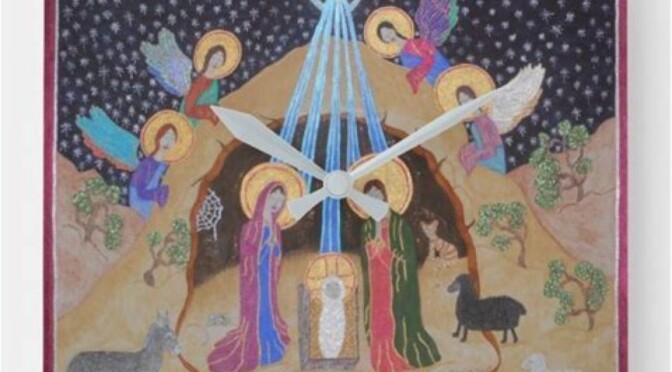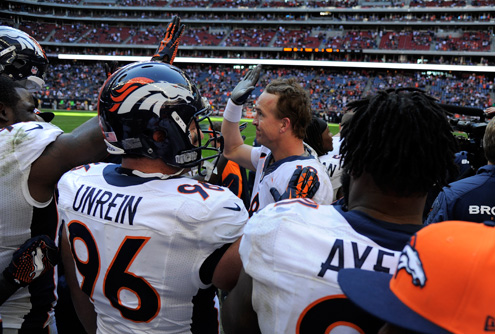Caitlin Trussell with Augustana Lutheran Church on December 24, 2021
[sermon begins after the Bible reading from Luke 2; Isaiah reading is at the end of the sermon]
Luke 2:1-20 In those days a decree went out from Emperor Augustus that all the world should be registered. 2This was the first registration and was taken while Quirinius was governor of Syria. 3All went to their own towns to be registered. 4Joseph also went from the town of Nazareth in Galilee to Judea, to the city of David called Bethlehem, because he was descended from the house and family of David. 5He went to be registered with Mary, to whom he was engaged and who was expecting a child. 6While they were there, the time came for her to deliver her child. 7And she gave birth to her firstborn son and wrapped him in bands of cloth, and laid him in a manger, because there was no place for them in the inn.
8In that region there were shepherds living in the fields, keeping watch over their flock by night. 9Then an angel of the Lord stood before them, and the glory of the Lord shone around them, and they were terrified. 10But the angel said to them, “Do not be afraid; for see—I am bringing you good news of great joy for all the people: 11to you is born this day in the city of David a Savior, who is the Messiah, the Lord. 12This will be a sign for you: you will find a child wrapped in bands of cloth and lying in a manger.” 13And suddenly there was with the angel a multitude of the heavenly host, praising God and saying,
14“Glory to God in the highest heaven,
and on earth peace among those whom he favors!”
15When the angels had left them and gone into heaven, the shepherds said to one another, “Let us go now to Bethlehem and see this thing that has taken place, which the Lord has made known to us.” 16So they went with haste and found Mary and Joseph, and the child lying in the manger. 17When they saw this, they made known what had been told them about this child; 18and all who heard it were amazed at what the shepherds told them. 19But Mary treasured all these words and pondered them in her heart. 20The shepherds returned, glorifying and praising God for all they had heard and seen, as it had been told them.
[sermon begins]
In the good news column, it’s Christmas Eve. Comforted by an ancient story, we’re connected with billions of Christians across time who have also celebrated Christmas. We pray for peace on earth and sing for good will among people. We pause amid the hush that’s like the quiet after the chaos of labor when a baby is born. In our minds’ eyes, we each see a baby in a manger and new parents hovering, possibly surrounded by radiant angels, noisy animals, and dusty shepherds. The holy, earthy scene celebrates Mary’s survival through childbirth, which was never a given back in the day – another thing in the good news column. The holiness of the scene in our collective imaginations is deepened by the pure humanity of it all. Mary was a person. Jesus was a brand-new person. And people have bodies. This also make Christmas about bodies. Mary’s body – pregnant, laboring, and lactating. Jesus’ body – slimy, squirming, and suckling. Mary’s permission given to the angel Gabriel to become pregnant by the Holy Spirit, and Joseph’s participation in God’s plan as the adoptive parent, needed their bodies by definition. Bodies are DEFINITELY in the good news column.
The “Good News Column” is how I’ve recently started talking about that that happen during the days, especially in a rough patch. It sounds like, “Well, there’s something for the good news column;” or just a simple, “In the good news column…” It’s unclear what it is about bad news that’s more compelling than good news. Perhaps for some of us it’s because if we keep an eye on bad news then at least it can’t surprise us. Or maybe our schadenfreude jolts us with glee when we learn bad news about people that we don’t like. Or maybe we just like the thrill of gossip and dishing the dirt. Whatever it is, we know that bad news hooks us in a way that good news doesn’t, which makes listing things in the good news column feel like an act of defiance.
In some ways, it IS defiance to even have a good news column in the face of so much bad news. Because it goes way beyond just the bad news that we pass on to each other for the glee of it. We know there are hard things jostling for space inside of us. We’ve brought it with us this evening into this place and time of comfort and joy. Some of us may feel guilty about the goodness of this moment when we or someone we know is hurting. There are people would give anything to live through their injury or disease but don’t live to see their next birthday. We honor their lives when we defiantly live into joy, listing something in the good news column that makes life all the richer because of our losses, not in spite of them. Which brings us back bodies. Another, lesser-known church term for Christmas is the Feast of the Incarnation which specifically names and celebrates God’s delivery in a human body through a human body. The mystery of the Incarnation, of God with us bodily in Jesus, is one that inspires imagination, defies easy answers, and clouds faith with doubt even as it comforts with God’s promise to be with us.
Our bodies are a wonder! A wonder of which we become most aware when our bodies’ fragile substance breaks or gets sick, cells or limbs or minds go wandering and wayward. It doesn’t take much to remind us of our fragility or to feel afraid of our bodies’ betrayals. We’re reminded as we grieve the deaths of loved ones and as we adapt to the steady hum of disappointments in pandemic. Perhaps fragility, grief, and disappointment are also reasons why the angel tells the shepherds, “Do not be afraid.” There’s so much for the shepherds to fear, not the least of which is an angel shining in the dark of night. The angel announces, “I am bringing you good news of great joy for all the people.” That’s an incredible statement. Let’s dream for a minute. If you could dream up something for the good news column that would be good news of great joy for everyone in the world – not just for you in your day, and not just for your group of like-minded people – what would that good news be? We tend to answer this question with our limited thinking. We often funnel good news for all people into geo-political answers within country or neighborhood borders. Or into familial answers within our families of origin.
But the angel’s good news is for everyone – “…good news of great joy for all the people…” And the angel first announces that good news to the very people who were outside of everything acceptable and considered good – the stinky, shady shepherds. The shepherds raced to the manger-side to see the good news for themselves. It’s hard to imagine everything that Mary might be pondering in her heart, but it’s highly likely that she was wondering what the shepherds were even doing there. Even so, she treasured and pondered their words.
Most of us find something in the good news column to treasure and ponder this Christmas.
Good news of the Wonderful Counselor who calms the troubled mind.
Good news of the Prince of Peace who brings peace through non-violence in our troubled world.
Good news of the Mighty God who challenges the status quo, promising liberation.
Good news of the Everlasting Father whose promises are so radically inclusive that this tiny Messiah in a manger will grow up to hang from a cross, reassuring us that God suffers with us when we suffer grief and pain.
Good news of a Savior who promises new life out of the hot mess you’ve made of yours.
Good news of a God who empties tombs, welcomes all to eternal life, and holds your fragile moments of faith and doubt, reassuring you that there is nothing you can do or not do to make God love you any more or any less.
Regardless of which part of the good news of Christmas that you put in your good news column, the fullness of Jesus is present with you even if you’re barely holding onto Jesus or aren’t sure you even want to touch him. Because the reality is that Jesus holds onto YOU. In fragile, unexpected places like the manger of communion bread and wine, Jesus’ presence is promised to you as a gift of grace this Christmas. We cradle his presence with our fragile hands as we receive communion, and inside our bodies as we eat. The perfect presence of Jesus remains despite our flaws or, just maybe, because of them. You are receivers of the good news, and you have first been loved by the One who is Good News. For this and for all that God is doing, we can put Christmas in the good news column, indeed. Amen and Merry Christmas!
___________________________________________________________
Isaiah 9:2-7 The people who walked in darkness
have seen a great light;
those who lived in a land of deep darkness—
on them light has shined.
3You have multiplied the nation,
you have increased its joy;
they rejoice before you
as with joy at the harvest,
as people exult when dividing plunder.
4For the yoke of their burden,
and the bar across their shoulders,
the rod of their oppressor,
you have broken as on the day of Midian.
5For all the boots of the tramping warriors
and all the garments rolled in blood
shall be burned as fuel for the fire.
6For a child has been born for us,
a son given to us;
authority rests upon his shoulders;
and he is named
Wonderful Counselor, Mighty God,
Everlasting Father, Prince of Peace.
7His authority shall grow continually,
and there shall be endless peace
for the throne of David and his kingdom.
He will establish and uphold it
with justice and with righteousness
from this time onward and forevermore.
The zeal of the Lord of hosts will do this.

![In the Good News Column [OR Is Christmas Really “Good News of Great Joy for ALL the People?”] Luke 2:1-20 and Isaiah 9:2-7](https://caitlintrussell.org/wp-content/uploads/2021/12/nativity-angels-munir-alawi-672x372.jpg)


![The Cross Revealed – John 18:1-19:42 [OR Some Good News on Good Friday – Yup, That John Krasinski]](https://caitlintrussell.org/wp-content/uploads/2020/04/Laura-James.-Jesus-Mother-Beloved-Disciple.-Cross-Crucifixion-672x372.jpg)
![The Logic of Leveling vs. Scarcity and Scapegoating [OR Jesus, Pops, and Pithy Sayings] Luke 6:17-26, Jeremiah 17:5-10](https://caitlintrussell.org/wp-content/uploads/2019/02/JOSE-TRUJILLO-OIL-PAINTING-JESUS-CHRIST-PREACHING.sermon-Caitlin-Trussell-672x372.jpg)
![Thievery, Shadows and Light [OR Why Matthew’s Year is Good News] Matthew 24:36-44, Isaiah 2:1-5, Psalm 122, Romans 13:8-14](https://caitlintrussell.org/wp-content/uploads/2016/11/NASA.JPL_.light-and-shadow-exhibit.sermon-Caitlin-Trussell-672x372.jpg)



